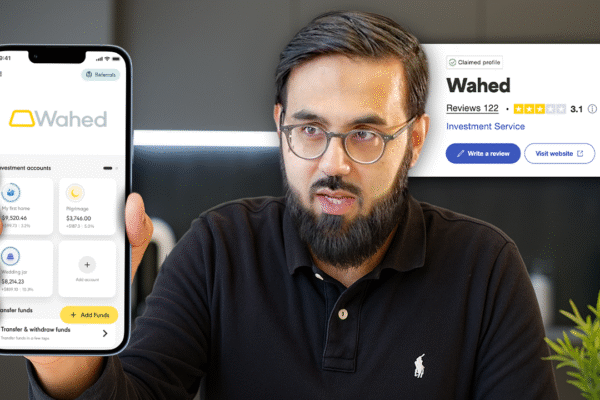
Is the S&P 500 Halal? A Guide for Muslim Investors
26 August 2025 7 min read


Mohsin Patel
Co-founder
4 min read
Last updated on:
Zakat is a tricky topic. There’s no getting past that fact. Anyone that thinks it’s simple probably doesn’t appreciate how much nuance is involved. And because we only get to zakat once a year, it’s not easy to stay on top of all the practical fiqh in that area. Since we get a bunch of investment-related zakat questions, we thought it would be good to write a piece on it so that everyone can benefit.
In this article, we’re going to cover a few key investments and how you approach zakat on them.
In this article specifically we’ll discuss zakat on buy-to-let property, pensions and shares. We appreciate that this is not comprehensive. For more detailed analysis see our zakat guide here and our zakat calculator here.
The key thing to understand with zakat is that there are lots of opinions on lots of different things (with very good scholars and reasons on all sides). So do your research and come to a conclusion. Zakat is ultimately a question of taqwa.
If you’d rather watch our zakat guidance, check it out here:
If you have a property that you rent out to someone and receive money for, you will need factor that in to your zakat calculations. The same applies if you have property through platforms like Yielders or Igloo Crowd. Our approach is as follows:
You pay zakat on the rental income which remains in your possession on your zakat date
So let’s say you pay zakat on 15 Ramadan every year. On that day, you have in your bank account, £2000 of rent, but you also have £1000 to pay as a mortgage payment for this month, and £200 to the plumber for some work. So you would pay zakat on £800. Crucially you don’t pay zakat on the value of the house overall (or even your share of the house) – just the income (rent).
In the same way, if you invest with someone like Yielders, you will pay zakat on the rental income you get in from them. Since your fees will be deducted from your rental income payment, you are effectively paying zakat on your net annual income.
So we can boil buy-to-let property down to a fairly simple rule: pay zakat on the net annual income from your property.
If you have an intention to resell a property, you should pay zakat on the whole value of the property. If you only part-own it (e.g. you have an Islamic mortgage on it) then you only pay for the portion you own.
Pensions are more nuanced. There are multiple views on this.
Our preferred view (after much thinking and consultation) is that you pay zakat on 40% of your pension pot value if you have a normal workplace pension (but make sure your workplace pension is halal in the first place).
So let’s say you log in to your workplace pension provider and it shows the value is £100,000. Take 40% (£40,000) and pay 2.5% on that (£1,000). An easier way to get to that calculation is to pay 1% of your pension pot as zakat.
Where you don’t have the cash to pay that amount, you may defer the payment until you receive your pension or until a later year – or you could just set up a direct debit for this year to even out the payment.
The reason for the 40% figure is that because your pension is likely to be invested in the stock market, a good rule of thumb when it comes to funds is that 40% of their assets will be zakatable. For a full discussion on zakat on shares and funds, check this article out.
Where you do not control where your pension is invested and/or your pension is a defined benefit scheme (e.g. the NHS pension), you do not have to pay zakat on it until you actually receive your pension – and then it is zakatable just like any other money in your account on your zakat date.
Why the difference? A defined benefit scheme is viewed by scholars as a deferred salary. It’s not something you actively contribute to or even control. Whereas a standard workplace pension is an investment that you’re making monthly and it’s being done for your benefit.
The fact that you cannot access the money is irrelevant. It exists and it’s locked away for your benefit. This is the view of Mufti Faraz Adam.
The long and short of it is that you need to be factoring in your pension for zakat. A lot of people miss this.
If you own shares in a public company, you have to pay some zakat on it. There are broadly three approaches – we’ve discussed these before in this article so please do read that.
Our preferred approach is manually working out the zakatable assets of each company. You can do this by going to the balance sheet, and adding up the amount of the liquid assets the company has. Work this out as a percentage of the market capitalisation of the company. Then pay zakat on that percentage of your own holding.
So let’s say you work out that your company has £50m in zakatable assets. Its market cap is £500m. That means 10% of its assets are zakatable. You then take 10% of the value of your holding and pay 2.5% on it. So if your holding is £5,000, 10% of it is zakatable (£500). You then pay 2.5% on this £500 (£12.50).
There a few different ways to approach shares. Choose which one you think best having read the article.
This is a whistle-stop tour of some of the more popular investment topics when it comes to zakat. Check out our full zakat guide here.

26 August 2025 7 min read

24 July 2025 15 min read
Leave a Reply